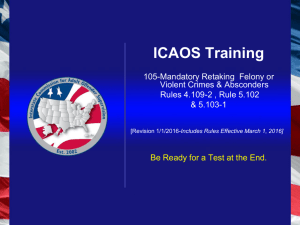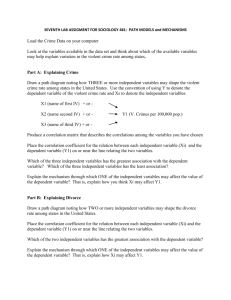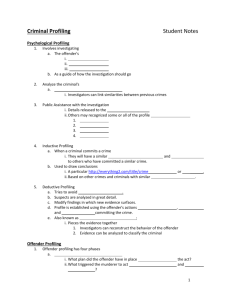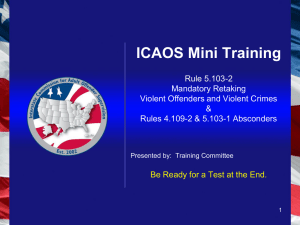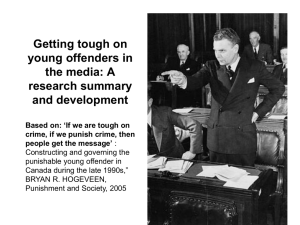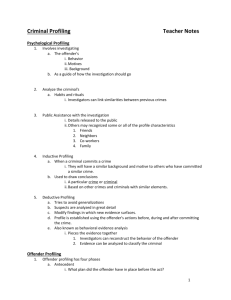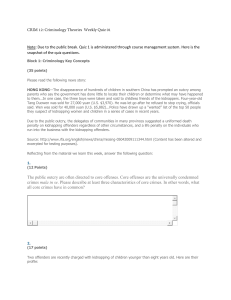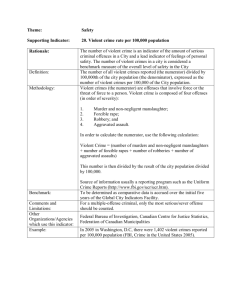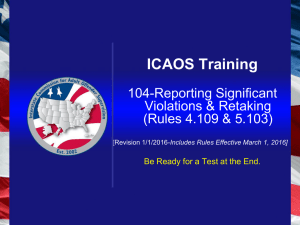Presentation - Interstate Commission for Adult Offender Supervision
advertisement
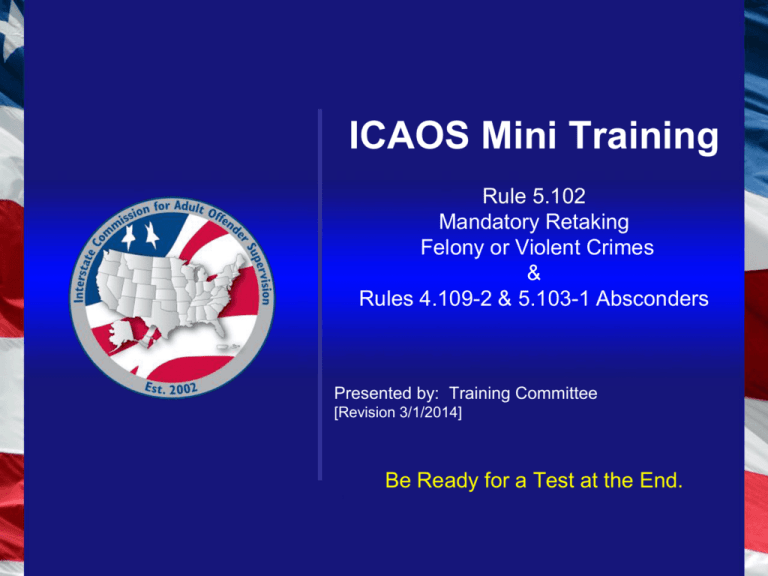
ICAOS Mini Training Rule 5.102 Mandatory Retaking Felony or Violent Crimes & Rules 4.109-2 & 5.103-1 Absconders Presented by: Training Committee [Revision 3/1/2014] Be Ready for a Test at the End. Training Objectives Define “Warrant” What triggers Rule 5.102? • Define “Violent Crime” • Conviction for a new violent crime • Conviction for a new felony offense What triggers Rule 4.109-2 & 5.103-1 ? • Define “Abscond” • 3 Elements of “absconding” “Warrant” Definition • “Warrant” means a written order of the court or authorities of a sending or receiving state or other body of competent jurisdiction which is made on behalf of the state, or United States, issued pursuant to statute and/or rule and which commands law enforcement to arrest an offender. The warrant shall be entered in the National Crime Information Center (NCIC) Wanted Person File with a nationwide pick-up radius with no bond amount set. “Violent Crime” Definition • “Violent Crime” means: 1. Unlawful exertion of physical force with the intent to cause injury or physical harm to a person; OR 2. Offense in which a person incurred direct or threatened physical or psychological harm as defined by the criminal code of the state in which the crime occurred; OR 3. Use of a deadly weapon in the commission of a crime; OR 4. Sex offense requiring registration Mandatory Retake for a New Felony or Violent Crime • Upon the request of the receiving state, the sending state shall issue a warrant and retake: – after notice an “offender” has been convicted of a new felony offense OR “violent crime” Rule 5.102 “Upon a Request of the Receiving State….” • Receiving State: – Has exhausted options – No longer a good “plan of supervision” The receiving state may notify using a Progress Report when not asking for retake. “Abscond” Definition • “Abscond” means to be absent from the offender’s approved place of residence or employment and avoiding supervision Three Elements of Absconding Activities shall include, but are not limited to: 1) Conducting a field contact at the last known place of residence; 2) Contacting the last known place of employment; if applicable; 3) Contacting known family members and collateral contacts. Rule 4.109-2 Absconder Violation Responsibilities Receiving State Sending State • Submit Violation Report • Submit Case Closure • Issue Warrant upon receipt • Respond to Violation Report • Validate Case Closure • Offender apprehended in receiving state • Conduct Probable Cause Hearing if requested • File detainer when in custody • Pending retaking, warrant MUST remain in place The Violation Report In ICOTS Violation Reports • Submit within 30 days of discovery • Must attach supporting documentation Abscond Example New Conviction Example Recommendations Recommendation must be: Warrant should be issued. Response to Violation Response to Violation • A sending state shall respond no later than 10 business days • Response shall include: 1. action to be taken 2. date action will begin 3. estimated completion date Rule 4.109 When the RS Closes the Case in ICOTS • Under Rule 5.102, close the case once the offender has been picked up by the sending state • Under Rule 4.109-2, close the case immediately after submission of absconder VR Rule 4.112 Liability • Liable is defined by Webster as “Legally obligated; responsible…” • All compact member states can be held liable for circumventing or violating the ICAOS rules. • ICAOS rules are federal law and there is a legal obligation to follow and enforce the rules as written. Scenario #1 To invoke retaking under Rule 5.102, the offender must be convicted of either a new felony offense or violent crime (felony or misd.) a) True b) False Scenario #2 I am supervising an interstate compact offender and he has failed to report to his last 2 office visits. I can submit a Violation Report and Case Closure for absconding to the Sending State. a) True b) False Scenario #3 In order to invoke Rule 5.102, a receiving state must report a new felony or violent crime conviction within: a) b) c) d) 15 business days of discovery 30 calendar days of discovery 60 calendar days of discovery No time limit, Receiving state can report when they no longer wish to supervise the offender. Scenario #4 I am an officer in the receiving state that is supervising an offender who is currently on probation for Possession of Controlled Substance (F). While under supervision in my state, the offender receives a new conviction for Battery Domestic Violence (M). Based on the “Violent Crime” definition, this offender may be subject to mandatory retaking requirements under ICAOS Rule 5.102. a) True b) False Scenario #5 • The sending state must respond to a violation report within: a) 2 business days b) 10 business days c) 30 calendar days d) 120 calendar days Questions
